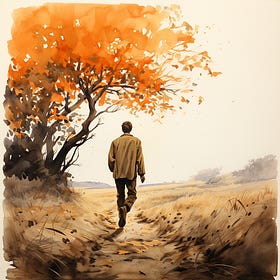Do we harness the ancient healing power that nature bestows upon us, or do we confine our lives exclusively to the triangle of work, commuting, and home, much like captive zoo animals? How great is our need for nature, and what are the consequences of its absence?
I recently read some interesting articles about biophilia, the love for life and living systems, and it got me thinking. Over the past decades, numerous studies have proven that the presence of nature, animals, and plants in our lives has a profoundly positive impact. It reduces our stress levels, lowers the occurrence and severity of mental illnesses (ADHD, depression, autism, etc.), speeds up post-surgery recovery, enhances concentration, and more. Those with pets are well aware of these benefits.
We often take many things in our lives for granted, such as city living, office desk confinement, crowded trams, computer screens, and electromagnetic pollution. We were born into this, and this is our life. We feel it is impossible to change it so it might come as a surprise to many when they hear about a family moving deep into the forest, setting up camp in a yurt, or when another family embarks on a world tour with their two young children on a sailing boat.
If we ponder our city life, it’s monotony, the similarity of each day, and how little time we spend outdoors in our natural environment, we might realize that we resemble melancholy gorillas munching on bananas at the zoo more than free individuals.
Yes, I know this comparison might sound extreme. After all, a gorilla cannot leave its enclosure even if it wants to, while we have the choice, don’t we? But do we make that choice?
When we feel like we can’t endure another day under artificial lighting, among machines, inside a windowless office where a device delivers what’s everywhere — air, do we take a different path?
Do we choose otherwise?
I remember how suffocating it felt when I used to work in an office. I carried a heavy laptop all day, was frustrated that I couldn’t secure a desk near one of the two windows that could be opened to let fresh air in, and I physically ached when I had to stay indoors on a sunny day. My soul screamed not to subject it to this. Yet, it took many long years for me to move out of the city, quit my job, and create a life where my soul didn’t wither every day. A crucial part of this life is nature, the spacious fields where we walk our dogs every day, recharging our spirit.
For millennia, the sight of plants brought relief because it meant there was something to eat, shade, a roof over our heads, and water. In other words, everything necessary for survival was present. Consequently, our stress levels automatically decreased when we saw greenery around us, and this effect persists today. When survival is assured, we can focus on other matters and concentrate better on more complex tasks. This explains why productivity increases in environments rich in greenery.
Centuries ago, monasteries considered gardens as a crucial pillar of healing, but this knowledge was forgotten as we started placing excessive trust in medical science. Fortunately, in recent decades, we’ve begun rediscovering the incredible power of nature.
So, what I truly wanted to convey is this: Let’s not forget how much luckier we are than a sad gorilla nibbling on a banana. We have a choice! Let’s bring plants into our offices and care for them. Let’s take a walk in the park during lunch breaks and go on hikes with our families on weekends. Let’s hug our pets (except for goldfish), enjoy the sunshine, and take a walk barefoot in the park!
– Eszter
Related Article
Walk Through the Difficulties!
Home | Notes | Articles | Eszter’s Magic | Literary Bonbons | Short Stories and Guides | Beyond the Book | EWE Issues | Archive | About





